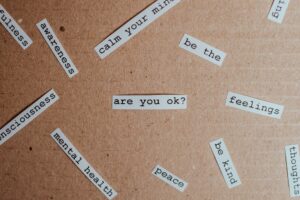Were you aware that self-blame, poor self-esteem, and shame are frequently common symptoms of Attention Deficit Hyperactivity Disorder? It’s not a very known fact that these emotions are often common symptoms of ADHD, and it’s essential to understand how they can sometimes lead to the condition being overlooked or misdiagnosed.
ADHD is often associated with difficulties in focusing, impulsivity, and hyperactivity. However, there’s a whole other aspect of ADHD that often remains in the shadows. Individuals with ADHD commonly experience self-blame, poor self-esteem, and shame as part of their daily emotional landscape. These emotions can be triggered by the challenges they face due to their ADHD symptoms. Oftentimes, individuals with ADHD can make small mistakes, without even realizing it, and the consequences can have big effects. Individuals with ADHD may struggle with their memory, remembering small details, interrupting conversations, time-blindness – leading them to be late frequently, difficulties concentrating on tasks/needs, difficulties with motivating themselves to do routine tasks, thrill-seeking, and excessive talking or thinking. These behaviors frequently affect their external world in a way that many neurotypical individuals may struggle to understand, or validate. Many ADHD individuals will experience interpersonal struggles and invalidating environments, which can lead to these symptoms of shame and poor self-esteem, as well as self-blame.

Imagine constantly struggling to stay organized, keep track of responsibilities, or concentrate on tasks, having others potentially tell you you’re not meeting the mark, “other people don’t have these issues,” and possibly being compared to others that may or may not have similar difficulties as you. It’s only natural that over time, feelings of inadequacy, self-doubt, and self-blame may creep in. The negative self-talk that results from these struggles can lead to a vicious cycle of shame and guilt, making it even more challenging for those with ADHD to manage their condition effectively.
One of the reasons ADHD can be overlooked or misdiagnosed is the overlap of symptoms with other conditions, particularly depression. Studies have shown that those with ADHD have a higher risk of developing depression. Both ADHD and depression share some common symptoms, such as difficulty concentrating, mood swings, and irritability. This overlap can lead to confusion, as individuals may exhibit similar symptomology.
However, it’s crucial to differentiate between these two conditions. While depression is primarily a mood disorder characterized by pervasive feelings of sadness, hopelessness, and loss of interest in previously enjoyable activities, ADHD is a neurodevelopmental disorder primarily marked by difficulties with attention, impulsivity, and hyperactivity. Additionally, individuals with ADHD tend to experience mood fluctuations that are more reactive to external stimuli, such as their ADHD-related challenges. Sleep can also be affected by both diagnoses, especially when sleep affects executive functioning, making this more difficult to differentiate between the two. It is important to have a detailed history of your symptoms and patterns as well, going back as far as childhood.
A Few DBT Coping Strategies to Assist with ADHD Symptoms:
1. Mindfulness:
This practice encourages individuals to observe their present moment, including their external environment, and internal thoughts and feelings without judgment or attachment. By developing mindfulness, those with ADHD can become more aware of their self-blaming and negative thought patterns. Recognizing these thoughts as they arise can be the first step toward disarming their emotional power. By engaging in less judgmentalness, they may be able to reduce the amount of self-blaming thoughts that generally occur. Please read into the What & How Skills of Mindfulness for further information on how to implement these strategies.
2. WiseMind:
WiseMind is one of the pieces of mindfulness that I thoroughly enjoy. WiseMind is where we are joining both sides of the brain/states of mind together. Generally speaking, we have 3 states of mind: Reasonable mind, emotion mind, and WiseMind. None of these are good or bad, they just are. Most will find that when you are most effective in a situation, you are most likely in WiseMind. In DBT, we want to learn to channel WiseMind whenever we might need it. Everyone has a WiseMind, so there’s no need to “create” one, just foster it more effectively. If you’ve ever had a situation in which you really wanted to go to a party that you were bursting at the seams about to ask to go to, but when you saw your caregiver’s facial expressions and thought “maybe another time,” you were most likely acting from your WiseMind. If you were being “driven” by facts logic or reason, not attending to emotions of others or your own, we would say you were in reasonable mind. If you were being motivated by emotion, without considering the logic and facts, we would consider you to be in emotion mind. In WiseMind, we would consider the reason and facts, as well as the emotions, to find the synthesis between the two for the best option. The way we suggest tapping into your WiseMind in DBT is by doing different WiseMind practices. Here are two:
- Dropping into the pauses between your in and out breaths
- Inhale through your nose slowly, pause, and expand your awareness in the pause until you exhale slowly. After the exhale, drop into the pause following your breath and continue until you feel centered.
- Visualizing Yourself Walking Down the Spiral Staircase
- Visualize yourself walking down a spiral staircase within you. Walk down the spiral staircase and create the building around you as you like. With as much light as you want, as many windows, go as far down the staircase as you need to feel centered. It can help to slow your breathing down during this practice.
WiseMind can assist individuals with ADHD symptoms discussed in this blog by slowing down their reactions, increasing a feeling of centeredness, and feeling more in control of their behaviors and thoughts.
 3. Interpersonal Effectiveness Skill – FAST:
3. Interpersonal Effectiveness Skill – FAST:
FAST is an interpersonal effectiveness skill that focuses on self-respect effectiveness. It is an acronym that stands for:
- Be Fair – to yourself and others in a situation
- No Apologies – don’t apologize for reasons that are unnecessary or when you have not done anything ‘wrong.’ A good rule of thumb I was taught, was if you were not told you caused any harm, it is not a common reason that people report feeling harmed, and you did not observe any harm done, you have not met the criterion to give an apology.
- Stick to Your Values – don’t sell out your morals/values/goals for reasons that are not important (i.e. the person won’t leave you alone, you want to keep the peace, etc.).
- Be Truthful – be honest, don’t lie, don’t act helpless when you are not, don’t exaggerate your situations.
This skill can be helpful for those who suffer with self-blame, negativity, and shame as they can often utilize parts of the skill to combat these symptoms. For example, if a person were self-blaming, they could compare how other individuals with ADHD or struggles such as theirs would do (to be Fair to themselves). They might also utilize the reminder of no Apologies, as a way to see if they caused harm to themselves or others due to their behaviors/symptoms.
The connection between self-blame, negativity, and shame in individuals with ADHD is a significant aspect of the condition that often goes unrecognized. It’s important to distinguish between ADHD and depression, as well as other diagnoses, as they may share overlapping symptoms but have distinct underlying causes. With the help of DBT coping strategies like mindfulness, WiseMind, and FAST skills, individuals with ADHD can better manage these difficult emotions and improve their overall well-being. Understanding these aspects of ADHD can lead to more accurate diagnoses and more effective treatment strategies, ultimately improving the lives of those who face the daily challenges of ADHD.
Sources:
Linehan, M. M. (2015). DBT® skills training manual (2nd ed.). Guilford Press.
https://neurodivergentinsights.com/misdiagnosis-monday/adhd-vs-depression
https://psychcentral.com/adhd/reducing-one-of-the-most-painful-symptoms-of-adhd#what-is-shame
https://psychologytoday.com/gb/blog/the-best-strategies-for-managing-adult-adhd/202305/do-you-struggle-with-adhd-and-feel-bad

